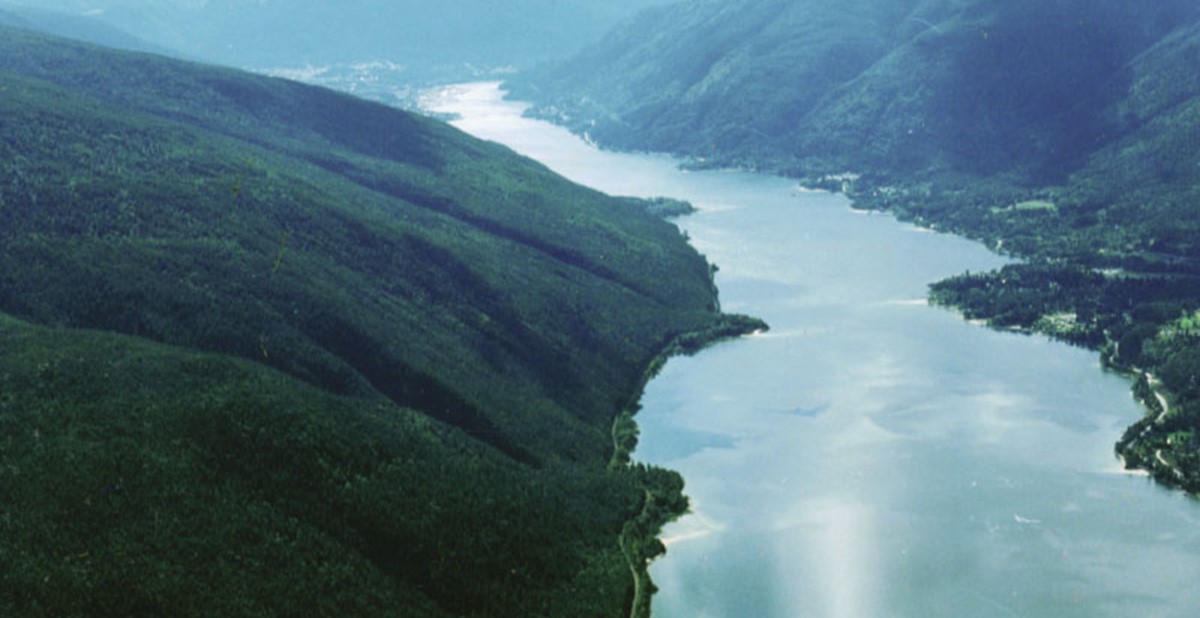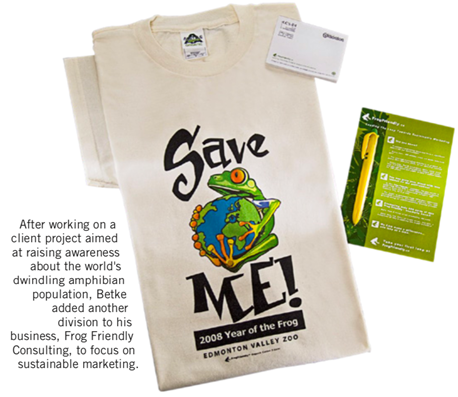Social Good: Campaigning To Save The Environment

Home to three trillion trees, our world is a green place—and David Betke wants it to stay that way. Betke, principal of distributor Do Better Marketing in Edmonton, Alberta, a division of Avatar Brand Management, Inc., uses his position as a promotional products professional to catalyze major environmental changes—so major, that his campaigns have successfully saved a 65,000-acre forest slated for logging, significantly reduced emissions in a city and called attention to the world’s dwindling amphibian crisis, among other feats.
Betke’s first project, and the one that kicked off his passion for cause marketing, involved the West Arm of Kootenay Lake in British Columbia. The year was 1990, and Betke launched the first iteration of his business, P.E.T. Project—“Preserving Our Environment For Tomorrow”—to save forests near his home that were facing threats of being destroyed. “I was tired of waking up to chainsaws and seeing some of the beautiful places I used to hike disappearing to logging,” he says. The Lasca Creek watershed on the West Arm of Kootenay Lake wasn’t just a forest, he explains, but one of the great stands of temperate interior rainforest. It was a cause that not only caught Betke’s attention, but also roused other community members as well. “Parents, grandparents, children and grandchildren were all out on the road trying to make sense of what they heard,” he says.
Betke decided, then and there, that he was going to do something about it. So, he got to work designing and printing t-shirts, stickers and magnets, and he hit the road, visiting colleges and universities throughout Canada and the U.S., selling merchandise and speaking with the media as much as possible. During the evenings, Betke says, he would visit area stores and ask store owners to carry his merchandise, post the petition and point-of-sale poster and support his letter-writing campaign in exchange for promoting their store at the school he was visiting that day. In all, Betke personally picked up 180 stores nationwide. And some five years later, the 65,000-acre West Arm Provincial Park was established, “protecting the forest forever,” he says.
Betke’s work has continued since then. The company’s most recent “win” includes saving a critical wetland and bird flyaway in southern British Columbia, now known as Crawford Creek Regional Park. “I donated strategic consulting, copywriting, a website and print design to influence the regional district to purchase the land and preserve it as a park,” Betke says. “We must be doing something right, because we now have another park.”
In addition to his work on the ground, Betke has also launched three mobile apps geared toward reducing waste and increasing the number of quality leads at trade shows and events. GreenTexts™ was created after Betke learned that many trade-show attendees leave behind print collateral after shows, rather than pay to ship it home. “I started calling convention centers and found this was a huge problem,” he says. “Tons of print is left behind after every event to be dealt with by each venue. That’s a lot of wasted trees.” Through the app, exhibitors can upload digital files of the print collateral at their booth, and attendees can choose which materials they would like to receive digitally. “At the end of the show, the exhibitor gets a list of segmented leads, which can significantly shorten their sales cycle. It’s incredible how much they can save on print alone—add increased leads and we have a winner.”
GreenClicks™, he says, is a “light” version of GreenTexts™ designed to replace printed brochures and catalogs. And SimpleLeads™ was created as a way to track promotional products at trade shows, but, he says, “It has evolved into an app that helps our clients determine which channels, including promo, are generating their highest-value leads. The better results we can create, the less waste per lead we are generating. That’s good for business and our environment.” Altogether, the three apps make up Betke’s PrintFree™ app family.
 Do Better Marketing also offers a referral incentive program with an eco-conscious angle, known as SwagPoints. Through a partnership with Wearth®, a conscious business that provides companies with eco-friendly options—including ForestFarmer, which allows individuals or companies to have trees planted in their name; CarbonFarmer, which helps offset the carbon footprint; and VintageFarmer, which grows certified organic grains—the distributor commits to planting trees on behalf of corporate social responsibility programs. “We have committed to plant a tree for every single order we process, to plant multiple trees every time someone refers us to someone else who buys our products or apps, and, as an option to incentivize event attendees, to use our apps to reduce print.”
Do Better Marketing also offers a referral incentive program with an eco-conscious angle, known as SwagPoints. Through a partnership with Wearth®, a conscious business that provides companies with eco-friendly options—including ForestFarmer, which allows individuals or companies to have trees planted in their name; CarbonFarmer, which helps offset the carbon footprint; and VintageFarmer, which grows certified organic grains—the distributor commits to planting trees on behalf of corporate social responsibility programs. “We have committed to plant a tree for every single order we process, to plant multiple trees every time someone refers us to someone else who buys our products or apps, and, as an option to incentivize event attendees, to use our apps to reduce print.”
And if all that’s not enough, Betke also launched another division of his business, Frog Friendly Consulting, after working on a cause to raise awareness about the world’s amphibian extinction crisis. “Amphibians are like canaries in a coal mine,” he says. “They are indicator species that point to the health of our environment, and they are disappearing at an alarming rate.” To provide a solution, Betke helped design an organic, cotton tee, printed in the most eco-friendly way he could find; the screens are even cleaned with a citrus-based cleaner and spray glue was replaced with a water-soluble adhesive. Following the campaign, he launched the new division with “a mission to lead the leap towards sustainable marketing.” During its first year, the division grew exponentially and added six figures in revenue to his business.
But aside from Betke’s large-scale work, there are ways that other distributor professionals can get involved in saving the environment on a smaller scale, he says. “Begin with what you consume or sell to others. Research the companies you support. Never take their claims at face value. There is so much greenwashing out there and our industry is certainly not immune. If someone claims they have a ‘green’ product, ask them, ‘Why is it green?’ If they are claiming it’s reusable or recyclable, ask them, ‘What is it made from? Is it made from virgin materials?’ If so, demand that they do better. If they claim it is recycled, is it made from production floor scraps or is it made from post-consumer recycled materials? Continually ask your suppliers to do better and support those who are doing so. Inspire your clients to do better by leading yourself. Sustainability is not a fad. It is the future.”
–––––––––––––––––––––––––––––––––––––––––––––––––––––––––––
Danielle Renda is associate editor of PPB.

